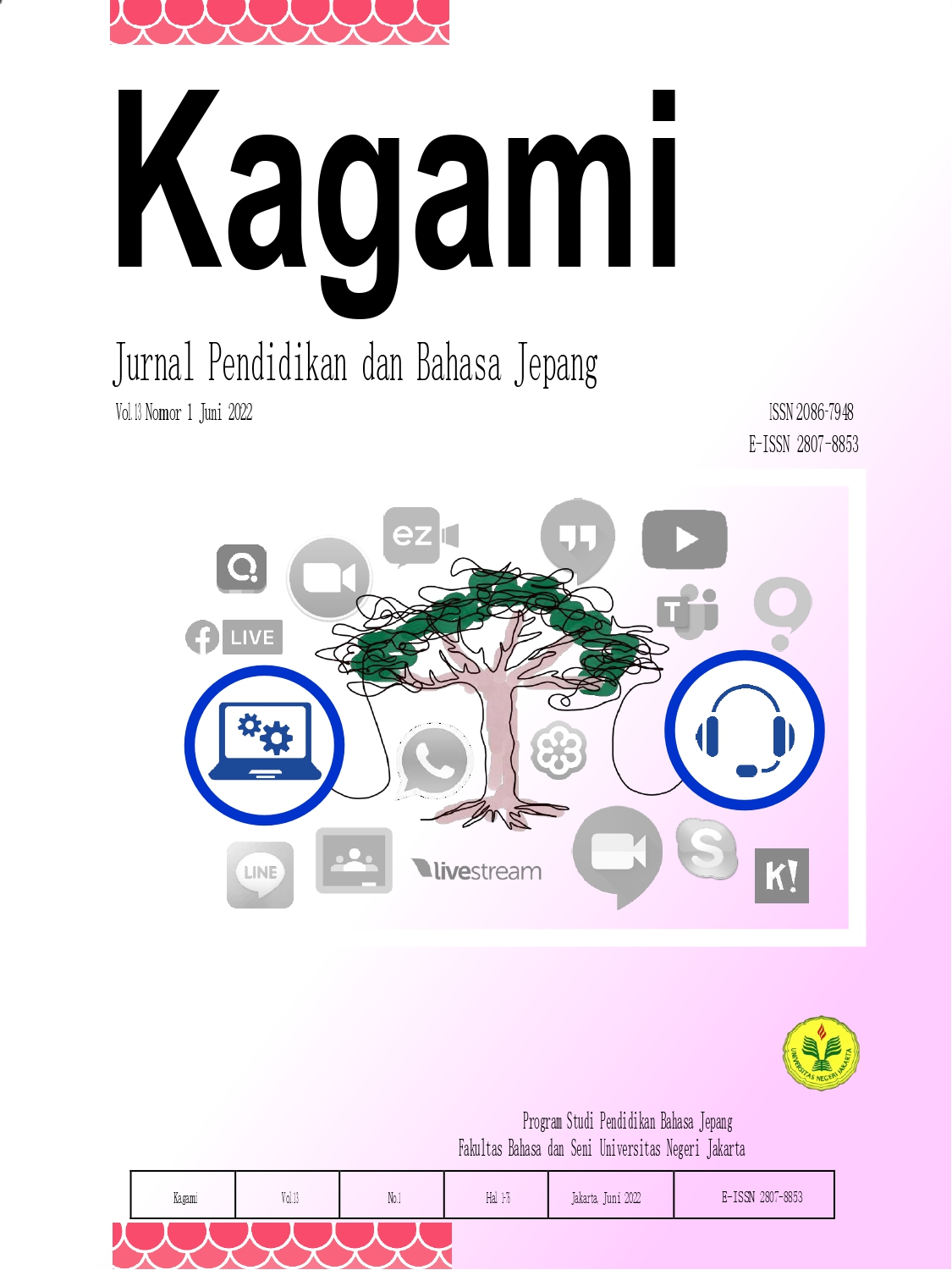Pengembangan E-Modul Interaktif Berbasis Android Dalam Mata Kuliah Bunpou I
Abstract
The purpose of this study is to produce an interactive prototype of an Android-based e-module and to find out the opinions of experts and students regarding the prototype. This multi-year research was carried out to answer the needs of students in obtaining and accessing learning material that is easier, cheaper, and not only has practical value but also flexibility value. The research can be a reference in developing 21st Century skills-based Japanese learning media. The first year of research uses the Research and Development (R&D) method with a descriptive-qualitative approach. The research took place from March to December 2021. Research’s sample was 21 students of Bunpou I, 2 media experts and 2 content experts. The results showed that this prototype got a score of 3.52 with category ‘very good’ for the content. It got 3.1 score for media display which is in category ‘good’. The results also showed that there are several notes for improving e-modules such as adding more interesting illustrations, improving forms and evaluation scores, improving user interfaces, adding sample sentences to reducing dependence on hyperlinks in the network. Most of the respondents liked this e-module and found it helpful in understanding basic level of Japanese easily. Bright color display makes learning less boring. The existence of videos, and exercises with a score system can also help increase learning motivation.
References
Argaheni, N.B. (2020). Sistematik Review: Dampak Perkuliahan Daring Saat Pandemi Covid-19 Terhadap Peserta didik Indonesia. Jurnal Placentum, 8(2). https://jurnal.uns.ac.id/placentum/article/view/43008/28002
Christiana, E. (2020). Burnout Academic Selama Pandemi Covid-19. Prosiding Seminar Bimbingan dan Konseling Online. http://conference.um.ac.id/index.php/bk2/article/view/74/77
Direktorat Pembinaan Sekolah Menengah Atas Direktorat Jenderal Pendidikan Dasar dan Menengah Kementerian Pendidikan dan Kebudayaan. (2017). Panduan Praktis Penyusunan E-Modul Tahun 2017. 1-57.
Direktorat Pembinaan Sekolah Menengah Atas Direktorat Jenderal Pendidikan Dasar dan Menengah Kementerian Pendidikan dan Kebudayaan. (2018). Panduan Praktis Penyusunan E-Modul Tahun 2018.
Febriani, R.D., Triyono., Rezki, H., Verlanda, Y., & Elrisfa, M. (2021). Factors Affecting Student’s Burnout in Online Learning. Jurnal Neo Konseling, 3, 32-38, DOI: 10.24036/00567kons2021
Fraga, J. (2019). A Guide to Burnout. Healthline. https://www.healthline.com/health/tips-for-identifying-and-preventing-burnout (diakses pada 1 Februari 2021).
Hakim, M. F. A. (2021). Peran Guru dan Orang Tua: Tantangan dan Solusi dalam Pembelajaran Daring Pada Masa Pandemi Covid-19. Riwayat: Educational Journal of History and Humanities 1(1), 23-32.
Surat Edaran Menteri Pendidikan dan Kebudayaan Republik Indonesia Nomor 3 Tahun 2020 Tentang Pencegahan Corona Virus Disease (Covid-19) Pada Satuan Pendidikan. https://www.kemdikbud.go.id/main/files/download/747d706176686b6 (diunduh pada 27 Februari 2021)
Laili, I., Ganefri, G., Usmeldi, U. (2019). Efektivitas Pengembangan e-Modul Project Based learning Pada Mata Pelajaran Instalasi Motor Listrik. Jurnal Ilmiah Pendidikan dan Pembelajaran (JIPP) 3(3).
Lubis, N. L. (2009). Depresi: Tinjauan Psikologis. Jakarta: Kencana.
Prodi Pendidikan Bahasa Jepang Fakultas Bahasa dan Seni Universitas Negeri Jakarta. (2020). Buku Panduan Akademik. Jakarta: Universitas Negeri Jakarta.
Sadiman. (2011). Media Pendidikan: Pengertian, Pengembangan, dan Pemanfaatannya Jakarta: PT Grafindo Persada.
Sari, A. K., Ertikanto, C., Suana, W. (2015). Pengembangan LKS Memanfaatkan Laboratorium Virtual Pada Materi Optik Fisi Dengan Pendekatan Saintifik. Jurnal Pembelajaran Fisika, 3(2), 5.
Schaufeli, B. W., Martinez, I. M., Pinto, A. M., Salanova, M., Bakker, A. B. (2002). Burnout and Engagement in University Students: A Cross-National Study. Journal of Cross-Cultural Psychology, 33(5), 464-481.
Suarsana, M.I., Mahayukti, G.A. (2013). Pengembangan E-Modul Berorientasi Pemecahan Masalah Untuk Meningkatkan Keterampilan Berpikir Kritis Peserta didik. Jurnal Nasional Pendidikan Teknik Informatika (JANAPATI), 2(3), 193. https://doi.org/10.23887/janapati.v2i3
Sugiyono. (2022). Metode Penelitian & Pengembangan-Research and Development. Bandung: Alfabeta.
Susanti, E.D., Sholihah, U. (2021). Pengembangan E-Modul Berbasis Flip PDF Corporate pada Materi Luas dan Volume Bola. Jurnal Pendidikan Matematika. 3(1), 37-56.
Yang, G., Sun, W., Jiang, R. (2022). Interrelationship Among University Student Perceived Learning Burnout, Academic Self-Efficacy, and Teacher Emotional Support in China’s English Online Learning Context. Frontiers in Psychology, 13(829193), 1-14. DOI: 10.3389/fpsyg.2022.829193.
Zainul, R., Oktavia, B., Putra, A. (2018). Pengenalan dan Pengembangan E-Modul Bagi Guru-Guru Anggota MGMP Kimia dan Biologi Kota Padang Panjang. https://doi.org/10.31227/osf.io/yhau2.
Copyright (c) 2022 Eva Jeniar Noverisa, Nia Setiawati, Viana Meilani Prasetio

This work is licensed under a Creative Commons Attribution 4.0 International License.




